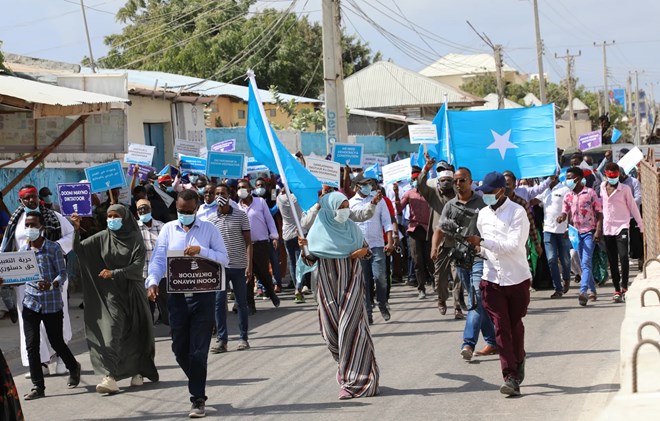
Sunday June 9, 2024
By Mukhtar Ainashe

FILE - Somalis march and protest against the government and the delay of the country's election in the capital, Mogadishu, Somalia, February 19, 2021.
The legitimacy and political relevance of the Somali Federal Government have been increasingly declining in recent years. This analysis examines the government's effectiveness and authority, focusing on federalism adoption, the power-sharing formula, political and constitutional crises, and evolving federal-regional relations.
In 2012, Somalia adopted a federal system, resulting in the creation of several federal member states, including Puntland (1998), Hirshabelle, Galmudug, Southwest, and Jubbaland. This move was aimed at decentralizing power and addressing the long-standing grievances of various clans and regions. However, the issue of Somaliland remains unresolved. Somaliland declared "independence" in 1991 and has since maintained a separate administration, seeking but failing to gain international recognition as a sovereign state.
Federalism was intended to provide a framework for power-sharing and resource distribution among the various regions. However, the implementation of federalism has been fraught with challenges. The federal member states often assert their autonomy, leading to tensions with the central government. For instance, Puntland has declared that it will manage its internal affairs independently until a national referendum is conducted, highlighting the ongoing struggle between federal and regional authorities.
The 4.5 clan system is a power-sharing formula that allocates political representation and resources among Somalia's major clans and minority groups. This system has brought a degree of political stability, enabling the country to hold presidential and parliamentary elections and facilitated peaceful transfers of power. However, the system is also perpetuating clan-based politics, corruption, nepotism, and vote-buying, which undermine the overall functionality of the government.
While the 4.5 clan system has helped maintain a semblance of stability, the underlying issues of governance remain unresolved. Corruption and nepotism are rampant, and the government often struggles to assert its authority beyond Mogadishu. The dysfunction at various levels of government further exacerbates the situation, leading to questions about the federal government's legitimacy and political relevance.
Puntland was the first federal member state to declare that it would invoke Article 4 of its constitution, allowing it to manage its internal affairs independently. This declaration was a response to the perceived unilateral actions of the federal government, which Puntland accused of failing to consult on matters of national importance. This move by Puntland has significantly weakened the legitimacy of the federal government and set a precedent for other regions to assert their autonomy.
Puntland's subsequent declaration that it does not recognize the legal and political legitimacy of the federal government has further strained relations between the center and the periphery. Puntland's accusations of unilateralism and lack of political consultation reflect broader grievances shared by other federal member states. This rift undermines the federal government's ability to govern effectively and raises questions about its overall legitimacy and political relevance.
President Hassan Sheikh Mahmoud's push for a controversial constitutional amendment in the federal parliament without proper consultation has been a significant blow to the legitimacy of the federal government. This amendment, passed during a period of heightened tensions with Ethiopia, has weakened the credibility of the parliament and the political processes in the country.
The timing of the amendment, coinciding with Ethiopian aggression and an illegal agreement with Somaliland, has further complicated the political landscape. The need for strong political leadership to unite the country against external threats was undermined by the controversial amendment, contributing to the perception that the federal government is not acting in the national interest.
The Federal Ministry of Foreign Affairs recently ordered the closure of Ethiopian consulates in Puntland and Somaliland. However, both regions defied the order, and the consulates remained open. This defiance highlights the limited authority of the federal government and its inability to enforce its decisions at the regional level.
President Hassan Sheikh Mahmoud's security advisor stated recently that Ethiopian troops must leave Somalia by the end of 2024. However, the security minister of the Southwest state rejected this plan, further undermining the federal government's security strategies after the ATMIS troops leave. This disagreement reflects the broader challenges the federal government faces in coordinating with regional authorities on security matters.
The federal government has struggled to deploy Somali National Army (SNA) soldiers to Jubbaland and the Southwest. The lack of success in these regions indicates the federal government's limited control over much of the country's territory. Additionally, there have been no SNA troops in Puntland or Somaliland since the collapse of the central government in the 1990s, further highlighting the federal government's limited reach.
The political gap between the federal leadership and the federal member states is at its lowest level in years. The federal government had no role or influence in the recent presidential and parliamentary elections in Puntland and is unlikely to have any meaningful influence in the upcoming elections in Jubbaland and the Southwest. This lack of influence beyond Mogadishu underscores the federal government's diminishing political relevance and legitimacy.
The Somali Federal Government faces insurmountable challenges in maintaining its legitimacy and political relevance. Unless drastic changes occur, the federal government is likely to continue losing legitimacy and political relevance. The future stability and unity of Somalia depend on addressing these challenges and fostering a more inclusive and cooperative federal system.
Mukhtar Ainashe.
Oslo, Norway.